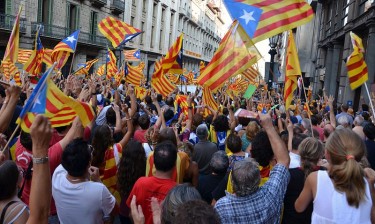Catalonia: Independence from Spain to Do What?
This post is part of our International Relations & Security coverage.

Pro-independence rally on Via Laietana (Barcelona) on September 11, 2012. By Lohen11 on Wikimedia Commons (CC BY-SA 3.0)
On November 25, 2012 Catalans headed to the polls for a snap regional election. The polls were staged just two months after a massive pro-independence rally took place in Barcelona. Voter turnout peaked at almost 70%, the highest in 30 years, and the four political parties committed to holding a referendum on self-determination (CiU-ERC-ICV-CUP) got more than twice as many seats as those defending the status quo (PSC-PP-C). Crucially, both of Catalonia’s major parties – the governing center-right CiU and socialist PSC – suffered severe setbacks.
Accordingly, it appears that Catalonia is now set to hold a referendum on its ties to the rest of Spain, and that it does not trust its major political parties to steer the process. Spain, however, will not make it easy for the Catalans to vote, as any attempt to divide Spain can be considered illegal under the country's constitution, written in 1978 after the fall of Francisco Franco's dictatorship.
Cultural differences aside, many Catalans feel attracted to independence because it would provide opportunities to build a new state that is more efficient, democratic, transparent, and innovative. An independent Catalonia could be very different from today’s Spain where economic crisis, opacity and patronage politics are often denounced to be commonplace.
But could an independent Catalonia lead to the break-up of the establishment dynamics that have dominated Spain since the late-1970s? The optimists believe so. For instance, the economic viability of an independent Catalonia has been widely discussed, and is considered possible so long as there are few trade barriers. But viability is not only about having enough resources. Economist Jordi Galí writes in a Catalan newspaper op-ed translated by the Wilson Initiative:
This report [“World Bank's Doing Business”] and other similar ones, such as the World Competitiveness Report, only confirm what is evident for any business manager: the Spanish institutional framework is far from being ideal for the generation of wealth based on productivity. The building of a new State offers, therefore, a unique opportunity to start, from scratch, an ambitious and engaging process that looks to the future without being weighted down by the past.
But how productive a society based on patronage politics can be? Taking inspiration from the book Why Nations Fail by Acemoglu and Robinson, Adrià Alsina writes on e-notícies [ca] on the need to change Catalonia’s power structures:
The extractive elites control public power and the big service companies, and form a caste that takes up the country's wealth just as parasitics do with hosts. They disguise it as national interest, public service or local industry protection, but it is always the same protection of the privileges of a minority over the interest of the majority.
In a follow-up article [ca], he adds:
If Catalonia reaches its own state, it will have the opportunity of getting rid of this yoke, but it could also just replace some extractive elites with for others.
…it is this structure that we have the opportunity to change in the next years: the terrible collusion between economic and political elites that lead us to disaster. To the real estate bubble financed by para-public banks at the service of politicians and construction businessmen, to the fact that most Catalan companies still date back to Franco's times.
Some doubt this structural change is possible with the major centre-right wing party CiU leading the process.
For example, the blog and Twitter account @CiUensRoba (‘CiU is Robbing Us’), with 6,810 followers, says on its Twitter profile description:
Catalunya es mereix una independència sense lladres. CiU ens ha robat llibertats, sobirania, identitat, benestar… i ho continuarà fent!
Catalonia deserves an independence without thieves. CiU has stolen our freedoms, sovereignty, identity, welfare… and will keep doing it!
Others point out that ending corruption generally is far more urgent than independence from Spain.
@Moragasanti: Al Oasi catala no hi han Datils (pel poble, clar) Volem la Independencia, pero amb la motxilla de la nostra corrupció política A sobre? Bdia
At the Catalan oasis there aren't dates (for the people, of course). We want independence, but with that sack of political corruption on our back?
@afarrasc: Els jutges han esperat el #25N+2 x imputar dirigents PSC per presumpta corrupció La indèpendència judicial és més urgent que la de Catalunya
@afarrasc: The magistrates have waited until #25N+2 to charge PSC leaders with alleged corruption. Judicial independence is more urgent than Catalonia's
An independence process would shake the political and economic order of the region. However, it will take much more than a referendum to shake social and power dynamics. Could it be a first step?